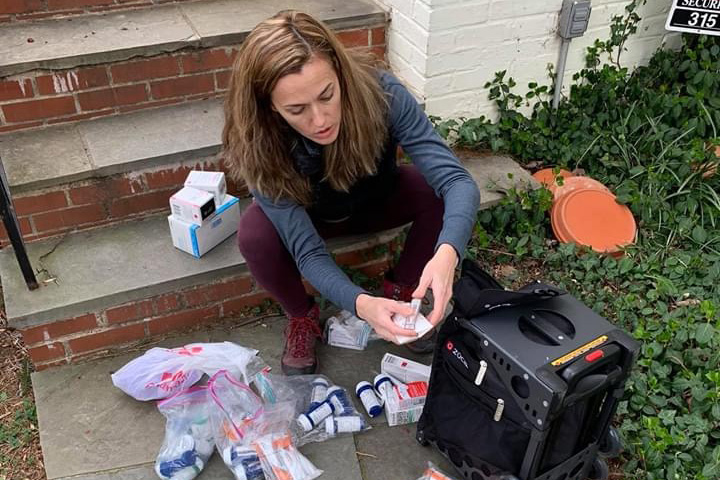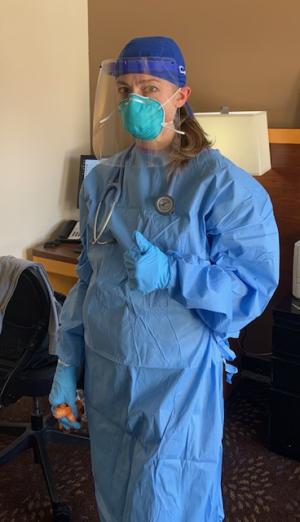Once her usual job sites closed due to coronavirus, a rolling bag became Emily Ramshur’s clinic. The family nurse practitioner walked the streets of Washington, D.C. with an outreach team, screening homeless people for COVID-19 symptoms and handing out masks and hand sanitizer. As coronavirus spread through the city, her responsibilities shifted to staffing a quarantine and isolation site at an area hotel.
By now, everyone is familiar with social distancing requirements: stay six feet away from others, don’t gather in large groups and avoid crowded places. But following these recommendations while sleeping on a bunk bed and taking meals in a communal dining room is more difficult.
“With the virus being as contagious as it is, they needed a place to go. You or I would stay in our homes, but they don’t have anywhere else to go,” said Ms. Ramshur, who graduated from GW Nursing’s M.S.N. program in 2015.
As the virus hit, Unity Health Care, the largest network of community health centers in Washington, D.C., began screening residents at local homeless shelters so that those exhibiting symptoms could isolate in area hotels. Ms. Ramshur, M.S.N. FNP-C, M.P.H., is site lead at one of those isolation and quarantine hotels.
She does intake telemedicine visits on new patients, tests those who haven’t been tested for COVID-19, flags those who are high-risk and performs telehealth visits or in-person exams when needed. Some of those in quarantine have been hospitalized as their symptoms worsened.
Data released May 6 by the Washington, D.C., Department of Human Services (DHS) show that 268 people from homeless shelters or who had been living on the streets are now in these quarantine sites. Ten homeless individuals have died of coronavirus.
Ms. Ramshur began working for Unity in 2015, shortly after becoming a nurse practitioner. Before the pandemic, she spent half of her time providing primary care at Unity’s second-busiest health center and half providing care at Pathways to Housing, an organization that offers a variety of services to those in need of housing, as well as two day centers for those who are homeless.
Ms. Ramshur turned her full attention to triaging and isolating those in greatest need. “We have 140 people in a hotel and we’re doing our best to make sure everybody is doing OK on any given day and has everything they need for their chronic conditions.”
Some of the conditions and risk factors that make people vulnerable to coronavirus—such as obesity, hypertension and diabetes—are common among those who are homeless, Ms. Ramshur said.
Tobacco and opioid use disorders are complicating the care of some individuals and have public health implications. People suffering from opioid withdrawal have left quarantine; she prescribes SUBOXONE® to help treat opioid dependence because those patients are then more likely to complete quarantine, Ms. Ramshur said.
As a nurse practitioner student at GW Nursing, Ms. Ramshur had completed the bulk of her clinical hours at Unity. Even with that experience, nine years as an emergency room nurse and a master’s in public health from Johns Hopkins University, she didn’t feel ready to care for patients experiencing homelessness until she had been a nurse practitioner for two years.
“We see such a wide variety of conditions that are, at times, very uncontrolled in the homeless population. In satellite homeless outreach sites, you are often the sole practitioner so it’s important to feel ready for full clinical independence.”
Though the health challenges her patients face are severe, Ms. Ramshur has been pleasantly surprised by how much primary and preventive care they receive, she said. Before the pandemic, Unity had several small satellite care sites as well as a larger site staffed with specialists.
Her time working in emergency rooms and on an international medical mission to Haiti as a GW Nursing student showed how crucial continuity of care is to managing health conditions, Ms. Ramshur said. That’s why she chooses to “meet patients where they are” by delivering medical care on the street. Ideally, that contact gets the patient into a clinic for follow-up care, creating a bridge to clinical continuity.
Amid a pandemic, caring for individuals means she’s also protecting everyone else’s health. Health care providers and local governments are taking extraordinary measures to help treat and stop the spread of COVID-19, but as of May 6, Washington, D.C., continues to see a daily rise in the number of confirmed COVID-19 cases.
“The most important thing any nonmedical people can do right now is stay home,” Ms. Ramshur said. “We are still very much in the peak in the D.C. region; it’s just critical that people follow the guidelines and stay home.”
Please consider honoring the work that nurses do each day by making a gift to support GW Nursing scholarships. Your gift today will support a student entering our accelerated B.S.N. program this fall.



